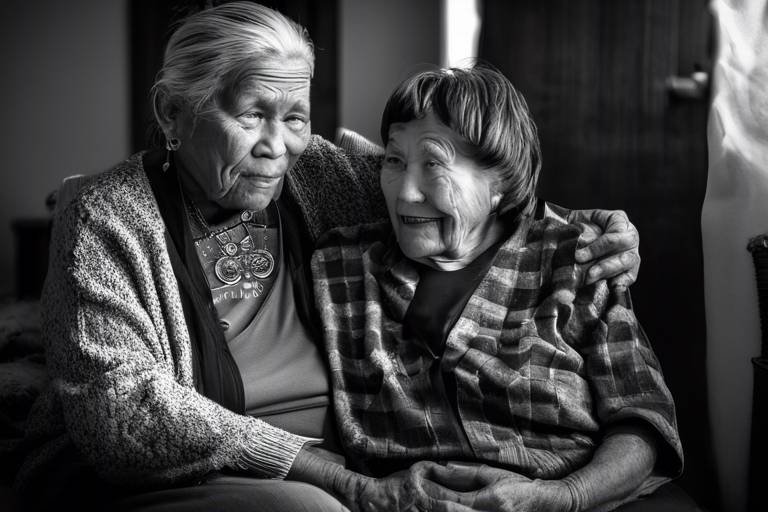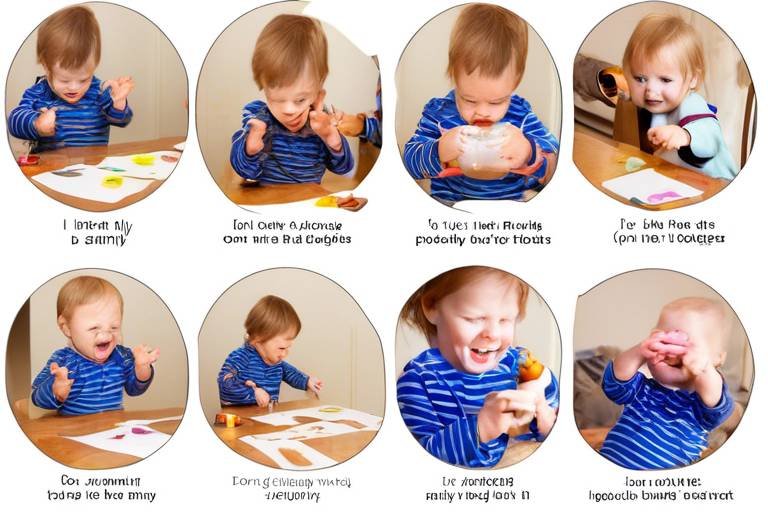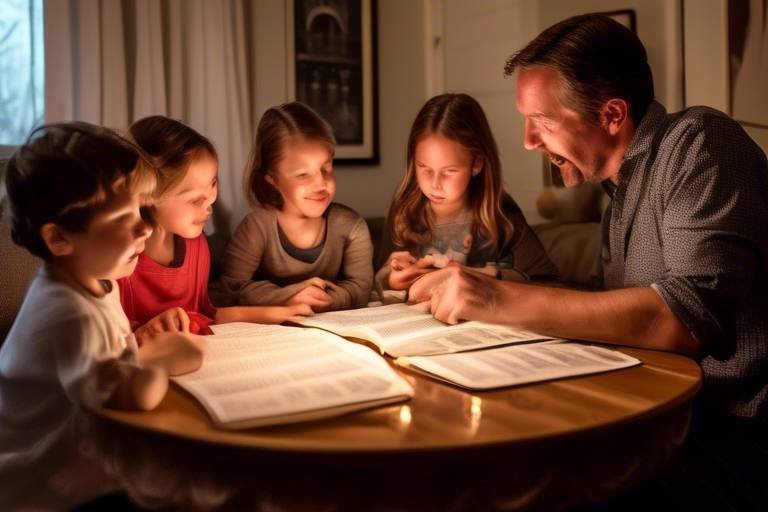Connecting Generations: An Interview with the Family Elder
In today’s fast-paced world, the significance of connecting with our family elders cannot be overstated. These remarkable individuals are not just the keepers of our family history; they are also treasure troves of wisdom and experience. Imagine for a moment sitting down with a grandparent or an elderly relative, sipping tea, and listening to stories that span decades. Their tales are not just mere anecdotes; they are lessons wrapped in experiences that can guide us through our own lives. This article explores the invaluable insights shared by family elders, highlighting their experiences, wisdom, and the importance of intergenerational connections in fostering understanding and unity within families.
Elders possess a wealth of knowledge gained through life experiences. Think about it: they have lived through historical events, societal changes, and personal challenges that have shaped their views and decisions. This section discusses how their insights can guide younger generations in navigating life's challenges and decision-making processes. For instance, many elders have faced similar struggles that younger family members might encounter today. By sharing their stories, they provide a roadmap, helping the younger generation avoid pitfalls and embrace opportunities with confidence.
Interviews with family elders can strengthen relationships like nothing else. Engaging in conversations with them fosters deeper connections and understanding among family members, promoting a sense of belonging and unity. When we take the time to listen, we show respect for their experiences and validate their feelings. This not only enriches our understanding of their lives but also creates a bridge between generations. As we delve into their stories, we often find common ground, shared values, and even humor that can bring families closer together.
Elders often hold the key to family stories and traditions. These narratives are more than just tales of the past; they are the threads that weave our family fabric together. This subsection emphasizes the importance of documenting these narratives to preserve family heritage and instill pride in future generations. Imagine creating a family tree that not only shows names but also includes stories, photos, and significant events. This living document can be a source of inspiration and pride for future generations, reminding them of their roots and the values that have shaped their family.
Every elder has a treasure chest of lessons learned from their own experiences. This section highlights specific anecdotes that can inspire younger family members to make informed choices. For example, an elder might recount their struggles during a challenging economic period, illustrating resilience and adaptability. These stories serve as powerful reminders that while times may change, the core values of perseverance, hard work, and integrity remain timeless. By sharing these lessons, elders empower younger generations to face their own challenges with courage and wisdom.
Engaging with elders requires active listening, a skill that is often overlooked in our busy lives. This part discusses techniques for effective communication that can help younger generations fully appreciate the wisdom being shared. Active listening involves giving our full attention, asking clarifying questions, and reflecting on what has been said. This not only shows respect but also enhances understanding. When we listen actively, we create a safe space for elders to share their thoughts and feelings, fostering deeper connections and mutual respect.
Creating a space for open conversation is crucial in any family dynamic. This section explores how families can encourage dialogue between generations, allowing for the exchange of ideas and perspectives. Families can organize regular gatherings where everyone feels comfortable sharing their thoughts. Whether it’s a family dinner or a casual get-together, these moments can spark meaningful conversations. By encouraging open dialogue, we break down barriers and create an environment where everyone feels valued and heard.
Families today face unique challenges that can strain intergenerational relationships. This part addresses how technology and societal changes impact these connections and the role of elders in adapting to these shifts. The rapid pace of change can sometimes alienate elders from younger family members, leading to misunderstandings. However, by fostering patience and empathy, families can bridge these gaps and find common ground.
Elders may struggle with modern communication tools, which can create a digital divide. This subsection discusses ways to bridge this gap and enhance interaction between generations through technology. Simple tutorials on using smartphones or social media can empower elders to connect with younger family members in new ways. Moreover, families can engage in tech-savvy activities together, turning learning into a fun bonding experience.
As society evolves, preserving family traditions becomes essential. This section examines how elders can help maintain these customs while adapting them for contemporary relevance. Traditions like family gatherings, holiday celebrations, or cultural rituals can be reimagined to fit modern lifestyles. By involving younger family members in the process, elders can ensure that these traditions continue to be meaningful and engaging for future generations.
- Why is it important to connect with family elders?
Connecting with family elders allows us to learn from their experiences and gain insights that can guide us in our own lives. - How can I encourage my family to share their stories?
Organize family gatherings, create a comfortable environment for sharing, and show genuine interest in their experiences. - What are some effective ways to listen actively?
Maintain eye contact, ask open-ended questions, and reflect on what the elder has shared to show that you value their input.

The Value of Elder Wisdom
Elders are like living libraries, filled with stories and lessons that can only be gleaned from years of experience. Their wisdom is not just a collection of facts; it’s a tapestry woven from the threads of joy, sorrow, triumph, and failure. Imagine navigating life without a map—this is often how younger generations feel when faced with challenges. However, by tapping into the wisdom of family elders, they can gain invaluable insights that illuminate the path ahead.
Consider this: when faced with a tough decision, wouldn’t it be comforting to have someone who has walked that road before? Elders can offer guidance that is both practical and profound. For example, they might share how they overcame personal struggles or made pivotal life choices. These stories are not merely anecdotes; they are lessons in resilience, patience, and the importance of maintaining one’s values amidst adversity.
Moreover, elders often possess a unique perspective on life that is shaped by the changing times they have witnessed. They can provide context to current events and societal shifts, helping younger family members understand the world in a broader sense. This intergenerational dialogue fosters a deeper appreciation for history and the lessons it holds. In fact, studies have shown that families who engage in conversations about their past tend to have stronger bonds and a greater sense of identity.
To illustrate the value of elder wisdom, let’s look at a few key benefits:
- Guidance in Decision-Making: Elders can provide insights that help younger generations make informed choices, whether it’s about career paths, relationships, or personal challenges.
- Emotional Support: The shared experiences of elders can offer comfort and reassurance during tough times, reminding younger family members that they are not alone in their struggles.
- Preservation of Family Values: Elders often serve as custodians of family traditions and values, ensuring that these are passed down to future generations.
In today’s fast-paced world, where instant gratification often overshadows patience and perseverance, the lessons from elders serve as a grounding force. Their experiences remind us that life is a journey filled with ups and downs, and it’s the way we respond to challenges that truly matters. By embracing the wisdom of our elders, we not only enrich our own lives but also strengthen the fabric of our family heritage.
In conclusion, the value of elder wisdom cannot be overstated. It’s a treasure trove of knowledge that can guide us through life’s complexities. So, the next time you find yourself at a crossroads, consider reaching out to a family elder. Their insights may just provide the clarity you need to navigate your path forward.
Q: How can I encourage my children to talk to their grandparents?
A: Create opportunities for interaction, such as family dinners or game nights. Encourage storytelling by asking open-ended questions about their lives.
Q: What are some ways to document elder wisdom?
A: Consider recording interviews, writing down stories, or creating a family tree that includes anecdotes from family elders. This helps preserve their legacy.
Q: How can I ensure that my children value the wisdom of elders?
A: Model respect for elders in your own behavior and share stories that highlight the importance of their experiences. Encourage your children to ask questions and listen actively.

Building Strong Family Bonds
When it comes to family, the bonds we create are often the most cherished connections in our lives. Engaging in conversations with family elders can be a transformative experience that not only strengthens these connections but also fosters a deeper understanding among family members. Imagine sitting down with a grandparent or an elder relative, sharing stories that span decades. Each tale not only offers a glimpse into their past but also serves as a bridge connecting generations.
These conversations can be incredibly enriching. By listening to the experiences of our elders, we gain insights that are often lost in the hustle and bustle of modern life. It’s like holding a treasure chest filled with lessons learned through joy, hardship, and everything in between. When families take the time to engage in these dialogues, they create an environment where everyone feels valued and understood. This sense of belonging is vital, especially in today’s fast-paced world where connections can sometimes feel superficial.
Moreover, the act of interviewing family elders can lead to some unexpected revelations. You might discover that your grandmother was a fierce advocate for social justice or that your uncle traveled the world as a musician before settling down. These stories not only enrich our understanding of who our family members are but also highlight the diverse paths that have shaped our family’s identity. By documenting these narratives, families can preserve their heritage and instill a sense of pride in younger generations, ensuring that these stories are not forgotten.
Furthermore, these interactions can help break down barriers that often exist between generations. For instance, younger family members might feel intimidated or disconnected from their elders due to differences in upbringing or perspectives. However, by creating a safe space for open dialogue, families can encourage the exchange of ideas and perspectives. This open communication allows for a deeper appreciation of each other’s experiences and fosters mutual respect. It’s a beautiful dance of understanding where both sides learn from one another, creating a harmonious family dynamic.
In essence, building strong family bonds through conversations with elders is not just about sharing stories; it’s about creating a legacy. These moments of connection can serve as the foundation for future generations, helping them navigate their own lives with the wisdom of those who came before them. By prioritizing these interactions, families can cultivate a culture of respect, understanding, and unity that will resonate for years to come.
- Why is it important to connect with family elders?
Connecting with family elders offers invaluable insights, strengthens family bonds, and preserves family history. - How can I encourage my family to engage with elders?
Organize family gatherings or informal interviews, and promote open dialogue to foster connections. - What are some effective ways to listen actively to elders?
Maintain eye contact, ask open-ended questions, and show genuine interest in their stories.

Sharing Family Histories
When it comes to family histories, elders often serve as the living archives of our past. They hold stories that are not just entertaining but are also rich with life lessons and cultural significance. Imagine sitting around a cozy living room, the smell of freshly baked cookies wafting through the air, as your grandparent shares tales of their youth. These moments are not just nostalgic; they are vital for building a sense of identity and belonging within the family. By sharing their experiences, elders weave a tapestry of family history that connects generations.
Family stories can range from humorous anecdotes to serious reflections on challenges faced and overcome. For instance, a simple story about a family vacation can reveal much about the values and traditions that shaped the family. It’s these narratives that help younger generations understand who they are and where they come from. They can provide context to today’s family dynamics, helping us appreciate the struggles and triumphs of those who came before us.
Moreover, documenting these stories is crucial. Many families have started to create family trees or history books that not only capture names and dates but also include stories, photographs, and personal reflections. This practice serves multiple purposes:
- Preservation: It ensures that stories are not lost to time, especially as elders pass on.
- Connection: It fosters a sense of unity among family members as they share and relive these tales together.
- Education: It teaches younger generations about their heritage, instilling pride and a sense of responsibility to carry on traditions.
In today’s fast-paced world, where technology often takes center stage, it’s easy to forget the importance of these stories. However, taking the time to listen and document them can be incredibly rewarding. Consider setting aside a weekend for a family storytelling session. Bring out the photo albums, ask questions, and encourage your elders to share their memories. You might be surprised at the wealth of knowledge and the hidden gems of wisdom that emerge during these conversations.
Ultimately, sharing family histories is about more than just passing the time; it’s about creating a legacy that can be cherished and carried forward. It’s a way to honor our past while shaping our future. So, the next time you find yourself with an elder, don’t hesitate to ask about their life experiences. You might just discover the roots of your family tree and the branches that have shaped who you are today.
Q: Why is it important to share family histories?
A: Sharing family histories helps to create a sense of identity and belonging, preserves valuable stories, and strengthens family bonds.
Q: How can I encourage my elder family members to share their stories?
A: Create a comfortable environment, ask open-ended questions, and show genuine interest in their experiences.
Q: What are some effective ways to document family histories?
A: You can create a family tree, compile a scrapbook, or even record video interviews with your elders.
Q: How can technology help in sharing family histories?
A: Technology can facilitate the documentation process through digital storytelling platforms, social media, and genealogy websites.

Lessons from the Past
When we think about the wisdom that our elders hold, it's like uncovering a treasure chest filled with invaluable lessons that can guide us through life's complexities. Each story they share is a thread woven into the rich tapestry of our family history, offering insights that are often overlooked in our fast-paced world. For instance, many elders recount experiences from their youth that highlight resilience and adaptability—qualities that are essential in today’s ever-changing landscape. These anecdotes are not just stories; they are blueprints for navigating challenges.
Consider the tale of a grandmother who faced economic hardships during her early adulthood. She often reflects on how she managed to stretch a tight budget by being resourceful and creative. This lesson in financial prudence is not only relevant but crucial for younger generations grappling with their own financial challenges today. By sharing such experiences, elders can illuminate paths that might otherwise remain hidden.
Moreover, the lessons from the past often encompass themes of perseverance, love, and the importance of community. For example, an elder might share how their family came together during tough times, emphasizing the significance of unity and support. These narratives can serve as powerful reminders of the strength found in family bonds, encouraging younger members to cherish and nurture their relationships.
Additionally, the wisdom of our elders often includes practical advice that can be applied to everyday situations. Here are a few examples of lessons that can resonate across generations:
- Embrace Change: Many elders have witnessed significant societal shifts and can teach us about the importance of being adaptable.
- Value Relationships: They often stress the importance of maintaining strong connections with family and friends, reminding us that these bonds are what truly enrich our lives.
- Learn from Mistakes: Stories of past failures can provide crucial insights, helping younger generations avoid similar pitfalls.
By actively engaging in conversations with our elders, we not only gain access to their wisdom but also foster a sense of respect and appreciation for their experiences. It’s essential to recognize that these lessons are not just relics of the past; they are living teachings that can influence our present and future. So, the next time you sit down with a family elder, remember to listen closely. You might just discover a lesson that could change your life.
- Why is it important to learn from family elders?
Learning from family elders provides valuable insights that can help navigate life's challenges, fostering a deeper understanding of family history and values. - How can I encourage my family to share their stories?
Create a comfortable environment for open dialogue, perhaps during family gatherings, where everyone feels free to share their experiences and wisdom. - What are some effective ways to document family stories?
Consider recording conversations, creating a family scrapbook, or starting a family blog to preserve these narratives for future generations.

Importance of Active Listening
Active listening is more than just hearing the words spoken; it's about engaging with the speaker on a deeper level. When conversing with family elders, this skill becomes essential. Imagine sitting down with your grandparent, who begins to share a story from their youth. Are you just nodding along, or are you truly absorbing the essence of their experience? Active listening allows you to connect with their emotions, understand their perspectives, and appreciate the wisdom they are imparting.
One of the key aspects of active listening is showing genuine interest. This means making eye contact, nodding, and responding appropriately to what they are saying. When you do this, it encourages the elder to open up even more, often leading to richer conversations filled with valuable insights. Think of it as a dance; when one partner leads with enthusiasm, the other is naturally inclined to follow suit. In this case, your engagement prompts the elder to share even more of their life stories, creating a beautiful exchange of knowledge.
Another important facet of active listening is the ability to ask thoughtful questions. This not only demonstrates your interest but also helps clarify any points that may not be immediately clear. For instance, if an elder mentions a significant event from their past, asking follow-up questions like, "What was that experience like for you?" or "How did that change your life?" can lead to deeper understanding and connection. This practice not only enriches the conversation but also shows respect for their experiences and opinions.
Moreover, active listening can help in recognizing the emotional undertones behind the words. Elders often convey their feelings through subtle cues, such as their tone of voice or facial expressions. By being attuned to these signals, you can gain insights into their emotional state and respond with empathy and compassion. This level of understanding fosters trust and encourages elders to share more openly, creating a safe space for dialogue.
In today's fast-paced world, we are often distracted by our phones, social media, and other commitments. However, when engaging with family elders, it is crucial to put these distractions aside. Taking the time to truly listen can transform a simple conversation into a meaningful exchange. It’s like tuning a radio to the right frequency; once you do, the music becomes clear and enjoyable.
To summarize, active listening is a powerful tool in building intergenerational connections. By showing genuine interest, asking thoughtful questions, and being attuned to emotional cues, you can create a rich dialogue that benefits both the elder and yourself. So, the next time you sit down with a family elder, remember to listen actively. You might just uncover stories and lessons that will resonate with you for a lifetime.
- What is active listening?
Active listening is a communication technique that involves fully concentrating, understanding, responding, and remembering what is being said.
- Why is active listening important when talking to elders?
It helps build trust, encourages deeper conversations, and allows for a better understanding of their experiences and wisdom.
- How can I improve my active listening skills?
Practice by eliminating distractions, maintaining eye contact, and asking open-ended questions to encourage dialogue.

Encouraging Open Dialogue
Creating a space for open conversation within families is not just a nice idea—it's a necessity. Imagine a family dinner where everyone feels free to share their thoughts and feelings. Wouldn’t that be a wonderful atmosphere? Open dialogue fosters understanding and helps bridge the gap between generations. To encourage this, families can adopt several strategies that promote genuine conversations.
First and foremost, it’s essential to establish an environment where everyone feels safe to express themselves. This means being non-judgmental and actively listening to what others have to say. When family members know they won’t be criticized for their opinions, they’re more likely to open up. Think of it as planting seeds in a garden; with the right care, those seeds can blossom into beautiful flowers of understanding and connection.
Another effective way to encourage open dialogue is to schedule regular family meetings or casual get-togethers. These gatherings can serve as a platform for discussing various topics, from family updates to personal challenges. It’s like having a family council where everyone’s voice matters. During these meetings, families can also introduce fun icebreakers or discussion prompts to get the conversation flowing. For instance, sharing a favorite memory or discussing a current event can spark engaging discussions that bring everyone closer together.
Furthermore, it’s crucial to practice active listening. This means not only hearing the words being spoken but also understanding the emotions behind them. Techniques such as nodding, maintaining eye contact, and summarizing what the other person has said can show that you value their input. Imagine having a conversation where you feel truly heard—how much more likely would you be to share your thoughts again? It’s all about creating that reciprocal relationship of trust and respect.
In addition to these strategies, families can also benefit from incorporating modern communication tools. For example, using group chats or video calls can help maintain connections, especially when family members live far apart. Even elders can get in on the action! Teaching them how to use these technologies not only bridges the generational gap but also keeps the lines of communication open. It’s a win-win situation that enhances family bonds.
Lastly, it’s important to recognize that encouraging open dialogue is an ongoing process. Just as we don’t expect a garden to flourish overnight, we shouldn’t expect immediate results in family communication. It takes time, patience, and consistent effort. Regularly checking in with each other and being open to feedback can help families navigate this journey together. Remember, every conversation is a step towards greater understanding and unity.
- What is the best way to start a conversation with an elder? Begin with open-ended questions about their experiences or stories. This invites them to share their wisdom.
- How can I ensure my family meetings are effective? Set a clear agenda, encourage participation, and create a comfortable atmosphere for sharing.
- What if family members are reluctant to share their thoughts? Be patient and lead by example. Share your own experiences to encourage others to open up.

Modern Challenges in Family Dynamics
In today's fast-paced world, families encounter a myriad of challenges that can strain their relationships and disrupt traditional dynamics. With the rapid advancement of technology and shifting societal norms, it's essential to recognize how these factors influence the intergenerational connections within families. Have you ever thought about how a simple text message can sometimes replace a heartfelt conversation? It’s a reality many families face today.
One of the significant hurdles families encounter is the digital divide. While younger generations are often tech-savvy, many elders may find themselves struggling with modern communication tools. This gap can lead to feelings of isolation among older family members, who may feel left out of conversations happening in digital spaces. Imagine trying to connect with your grandchild over a video call when you’re still trying to figure out how to unmute yourself! It can be frustrating, but it’s a challenge that can be overcome with patience and understanding.
To bridge this gap, families can take proactive steps to enhance communication. For instance, setting aside time for tech tutorials can empower elders to engage more fully with their families. Here’s a simple approach:
- Schedule Regular Tech Sessions: Dedicate a weekly time slot where younger family members can help elders navigate their devices.
- Use Simple Language: Avoid jargon and explain things in easy-to-understand terms.
- Encourage Practice: Allow elders to practice using technology in a stress-free environment.
Another modern challenge is the preservation of family traditions amidst societal changes. As lifestyles evolve, certain customs may seem outdated or irrelevant to younger generations. However, elders play a crucial role in maintaining these traditions while adapting them to fit contemporary life. Think about it: how can we celebrate a holiday without the stories and rituals passed down through generations? Elders can help bridge this gap by sharing the significance of these traditions and finding ways to incorporate them into the lives of younger family members.
For example, a family potluck can be transformed into a themed dinner where everyone brings a dish that represents their cultural heritage. This not only honors the past but also creates new memories and experiences that everyone can cherish. It’s about finding that balance between honoring tradition and embracing change.
In conclusion, while modern challenges in family dynamics can be daunting, they also present opportunities for growth and connection. By fostering open communication, embracing technology, and valuing traditions, families can navigate these challenges together, creating a stronger bond that transcends generations.
Q1: How can I encourage my elder family members to share their stories?
A1: Start by asking open-ended questions during family gatherings. Create a comfortable environment where they feel valued and heard.
Q2: What are some effective ways to maintain family traditions?
A2: Involve younger family members in planning traditional events, and encourage them to add their own twists to keep things fresh and relevant.
Q3: How can technology help in connecting generations?
A3: Use video calls, social media, and family group chats to keep everyone in the loop and encourage regular communication.

Navigating Digital Communication
In today's fast-paced world, digital communication has become the norm, transforming the way we interact and connect with one another. For many elders, this shift can feel overwhelming, akin to learning a new language. Imagine trying to navigate a bustling city without a map—this is often how our family elders feel when faced with smartphones, social media, and instant messaging. However, bridging this gap is not only possible but essential for fostering stronger family ties.
To begin with, it’s crucial to understand that elders may not be as familiar with the latest technology as younger generations. This can lead to feelings of frustration or isolation. For instance, many older adults might struggle with understanding how to use video calling apps like Zoom or Skype. But here’s the good news: with a little patience and guidance, these barriers can be overcome. Empathy is key here; take the time to walk them through the process, explaining each step as if you were teaching a child. This not only helps them learn but also strengthens your bond.
One effective approach to enhance communication is to set up regular family video calls. These calls can serve as a virtual family gathering, where everyone shares updates, stories, and laughter. It's a great way to make elders feel included and valued. You might say, “Hey Grandma, let’s have a weekly catch-up on Sundays!” This simple invitation can make a world of difference in how connected they feel.
Moreover, consider creating a family group chat on platforms like WhatsApp or Facebook Messenger. This allows elders to engage with family members daily, sharing photos, jokes, and memories. It’s like having a digital scrapbook that everyone can contribute to! Just be sure to explain how to use these apps clearly, and even offer to set them up on their devices. A little guidance can go a long way!
Another important aspect of navigating digital communication is ensuring that elders feel comfortable expressing their feelings about technology. Encourage them to voice their concerns or frustrations. Maybe they don’t understand why everyone is so glued to their phones or they feel left out of conversations happening online. By fostering an environment where they can speak openly, you not only validate their feelings but also create a space for meaningful discussions.
In summary, while there may be challenges in navigating digital communication with elders, the rewards are immeasurable. By approaching the situation with patience, empathy, and a willingness to teach, families can foster deeper connections that transcend generations. Remember, it’s not just about teaching them how to use technology; it’s about enhancing their lives and keeping the family spirit alive in this digital age.
- How can I help my elder family member learn to use technology?
Start with the basics—show them how to use their device and introduce one app at a time. Be patient and encourage practice. - What are some good apps for family communication?
Consider user-friendly apps like WhatsApp for messaging and Zoom for video calls. These platforms are widely used and relatively easy to navigate. - How can I encourage my elder to participate in family digital gatherings?
Make it a fun event! Plan themed calls, like a trivia night or a cooking session, to engage them and create excitement around these gatherings. - What if my elder feels overwhelmed by technology?
Reassure them that it’s okay to feel that way. Offer to help them at their own pace, and remind them that learning is a journey.

Maintaining Traditions in a Changing World
In a world that seems to be constantly evolving, the challenge of maintaining family traditions while adapting to modernity is both crucial and complex. Elders often serve as the guardians of these cherished customs, ensuring that the essence of family heritage is not lost in the whirlwind of societal changes. Imagine a beautiful tapestry woven with threads of memories, stories, and values passed down through generations; that’s what family traditions represent. But how do we keep this tapestry intact when new colors and patterns emerge?
One of the most effective ways to maintain these traditions is through storytelling. Elders can share the origins and significance of various customs, allowing younger family members to appreciate their value. For instance, during family gatherings, an elder might recount the history of a particular holiday celebration or a unique family recipe that has been passed down through the ages. This not only enriches the experience but also instills a sense of pride and belonging among the younger generations.
Additionally, adapting traditions to fit contemporary lifestyles can breathe new life into them. For example, if a family has a tradition of gathering for Sunday dinners, they might consider incorporating modern elements, such as virtual gatherings through video calls when distances separate family members. This way, the spirit of the tradition remains intact, while also embracing the conveniences of modern technology. The key is to find a balance between honoring the past and welcoming the future.
Moreover, engaging younger family members in the process of preserving traditions can foster a sense of ownership and responsibility. When children and teens participate in planning family events or even cooking traditional dishes, they become more connected to their heritage. This involvement can be as simple as allowing them to choose a new recipe to try during a family gathering or encouraging them to share their own stories during the meal. By doing so, traditions evolve naturally, reflecting the family's growth while still honoring its roots.
Another essential aspect is to create a family archive. This can include photographs, recordings of stories, or even a family recipe book. By documenting these traditions, families can ensure that they are preserved for future generations. A well-maintained archive serves as a tangible reminder of where the family comes from and can be a source of inspiration for younger members as they navigate their own paths in life.
In conclusion, maintaining traditions in a changing world requires a delicate dance of honoring the past while embracing the future. Elders play a pivotal role in this process, serving as the bridge between generations. By encouraging storytelling, adapting customs to modern contexts, involving younger family members, and creating a family archive, we can ensure that the rich tapestry of our family heritage remains vibrant and cherished for years to come.
- Why are family traditions important? Family traditions help to create a sense of identity and belonging, connecting generations and fostering unity.
- How can we adapt traditions for modern lifestyles? Traditions can be adapted by incorporating modern technology and making them more inclusive for younger family members.
- What role do elders play in maintaining traditions? Elders serve as the keepers of family history and traditions, sharing stories and wisdom that enrich the family's cultural heritage.
- How can we document family traditions? Creating a family archive with photographs, stories, and recipes can help preserve traditions for future generations.
Frequently Asked Questions
- Why is it important to connect with family elders?
Connecting with family elders is crucial because they hold a treasure trove of wisdom and experiences that can guide younger generations. Their insights can help navigate life's challenges, making the connection not just beneficial but essential for personal growth and understanding.
- How can I encourage my family to engage with our elders?
Encouraging family engagement with elders can be as simple as initiating conversations during family gatherings. You could also set aside dedicated time for interviews or storytelling sessions, creating an inviting atmosphere where everyone feels comfortable sharing and listening.
- What are some effective ways to actively listen to elders?
Active listening involves more than just hearing words; it requires focus and engagement. Techniques such as maintaining eye contact, nodding in acknowledgment, and asking open-ended questions can enhance the conversation, making elders feel valued and understood.
- How can we document family histories shared by elders?
Documenting family histories can be done through various methods, such as recording audio or video interviews, creating a family tree, or writing down stories in a family journal. This not only preserves the narratives but also instills a sense of pride and belonging in future generations.
- What challenges do modern families face in maintaining traditions?
Modern families often face challenges like busy schedules, geographical distances, and the influence of technology, which can dilute traditional practices. However, involving elders in adapting these traditions to fit contemporary lifestyles can help keep them alive and relevant.
- How can technology help bridge communication gaps with elders?
Technology can play a significant role in bridging communication gaps by offering tools like video calls, social media, and messaging apps. Teaching elders how to use these platforms can enhance their connectivity with younger family members, fostering stronger relationships.
- What lessons can younger generations learn from their elders?
Younger generations can learn invaluable lessons from their elders, such as resilience, the importance of family values, and practical life skills. Elders often share anecdotes that illustrate these lessons, providing relatable and impactful guidance.



















